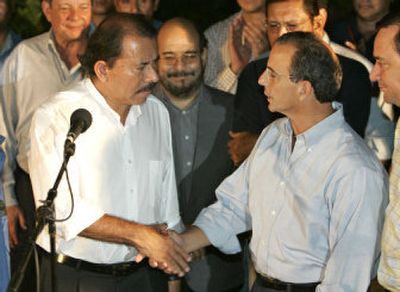Ortega wins in Nicaragua

MANAGUA, Nicaragua – Daniel Ortega completed a remarkable comeback Tuesday when the former Marxist revolutionary leader came out on top in a bitter presidential election that U.S. officials fear will give them a new left-wing antagonist in Latin America.
Nearly two decades after the U.S.-financed contra rebels helped drive Ortega from office, the Sandinista leader’s victory poses a new challenge in the region for the Bush administration, which must decide whether to treat Ortega as an enemy or accept his assurances that he has moderated his views.
The U.S. State Department said Tuesday that the Bush administration would wait to see the shape of a new Nicaraguan government. But several U.S. officials warned that aid and immigrant remittances to the hemisphere’s second-poorest nation would be in jeopardy if Ortega became president and aligned himself with leftist President Hugo Chavez of Venezuela.
In his fourth attempt to return to power, Ortega won a comfortable victory over four rivals, including Eduardo Montealegre, a Harvard-educated banker and former government minister who enjoyed U.S. backing.
The Supreme Electoral Council said Tuesday evening that with 91.5 percent of the votes counted, Ortega had 38.1 percent, followed by Montealegre with 29 percent and former Vice President Jose Rizo of the ruling right-wing party with 26.2 percent. Two other candidates trailed far behind.
Roberto Rivas, president of the Supreme Electoral Council, told a national television audience that he expected the margin to increase when the final votes are counted. He urged the losing parties not to question the results.
To win, Ortega needed only 35 percent of the vote and a margin of 5 percentage points over his nearest rival under new election rules he helped enact through his influence in congress. He benefited from a split on the right between Rizo and Montealegre, who had enough combined votes to defeat him.
Most observers said he was certain to lose in a December runoff if his opponents united around one candidate against him.
During the campaign, Montealegre and Ortega’s other opponents warned voters that voting for Ortega would return them to the dark days of the 1980s civil war and a crippled economy.
But during the campaign, Ortega reinvented himself as the candidate of reconciliation, welcoming a former contra leader as his running mate and sounding more like an evangelist when he urged massive crowds to vote for love and peace.
He reassured business leaders that he had shed his socialist ideas and would honor the Central American Free Trade Agreement with the United States.
Since the first results came in early Monday, Sandinista loyalists in the capital have rejoiced by launching fireworks and waving the party’s black-and-red flags in slums and around upscale shopping centers. National and international observers praised Sunday’s election and its aftermath as remarkably peaceful and orderly.
Representatives from an estimated 16,000 national and international observers noted voting glitches, such as the delay of results from rural areas, polling sites that opened late or closed early, and observers being denied entry.
But the consensus of the observers, which included the Carter Center, European Union and the Organization of American States, was that the glitches would not affect the outcome.